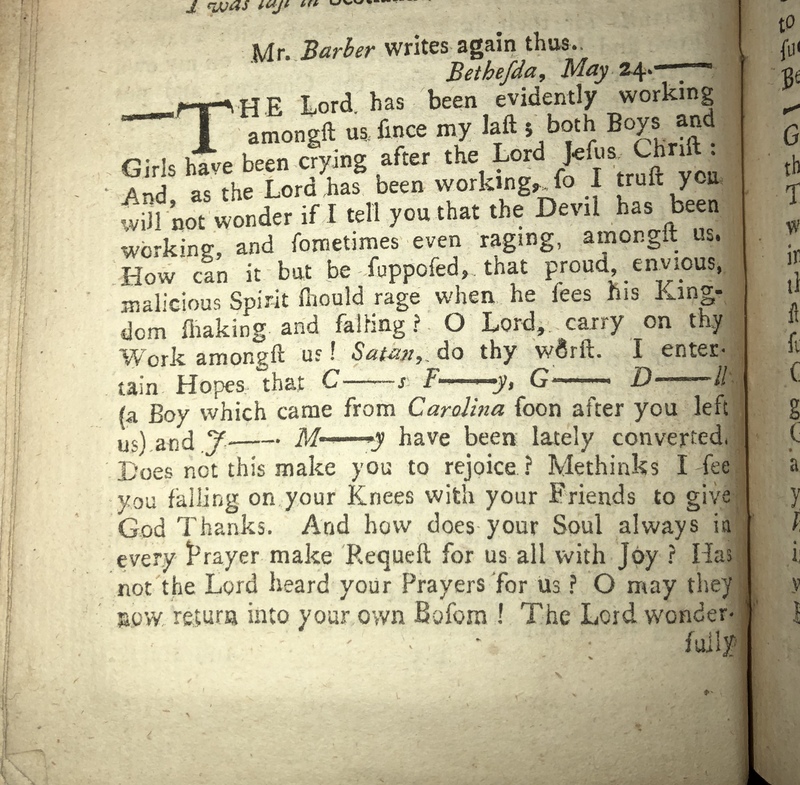A Continuation of the Account of the Orphan- House in Georgia
The financial contributions made to the Orphan House aided in the continuation of Whitefield’s teachings and goals for all of the people that it housed. The lasting impression that Whitefield was making on the children in Bethesda was evident to all of the people that encountered them. Throughout Whitefield’s work A Continuation of the Account of the Orphan House in Georgia, from January 174(0/1), to January 174(2/3) he builds on his goals for the Orphan House and shows the success he is having through the documentation of letters written to him regarding the impressive behaviors of the children. These letters being written to him are from the patrons that have already made financial contributions to Bethesda. George Whitefield states in this continuation that his goal through this writing is “to give a short Account of the Progress of the works since, both as to our temporal and spiritual Concerns, so far as lies in my power” (Whitefield 13). George Whitefield’s expectations have exceeded far beyond he imagined in more ways than one. There are many writings to Whitefield about the tremendous amounts of progress he has made with these young individuals, and most of these letters come from donors to the Orphan House. Mr. Barber, the superintendent of the spiritual affairs, writes to Whitfield in amazement of his visit to the Orphan House because the children were crying out after the Lord. This action of the children crying out “represents the transformation of religion in the colonies” (Watt par. 4). Mr. Barber was able to see that his money was being put to good use and that these children were learning key spiritual values. Whitefield makes it a point for the children in the Orphan House to spend three hours a day reading, praying and singing. Whitefield’s “ability to raise funds quickly and construct a nondenominational assembly house underscores the widespread support he received from the community at large” (Watt par. 6). Whitefield was able to raise funds for something he believed in, and it was recognized through these letters in this continuation of his personal account. Whitefield accounting for these letters, which points out the progress that he has made with these children is a representation of his success. The arrival of Whitefield during the Great Awakening was positive “because he was a strong advocate of personal virtue and morality, traits that the followers of the new religious movement valued as well” (Watt par.8). People that were supporters of this new religious movement at the time were more likely to make donations to the Orphan House because they believed in his message and they were inspired by his motivation for change and growth. Whitefield opened the Orphan House with the intentions to create a safe environment for the needy and to teach them his religious beliefs that they could carry through life. All of the financial issues that he ran into were obstacles that he needed to overcome in order to reach his goals, and these contributions helped him get there. Whitefield had a way with words and “the power of [his] proclamation and his ability to get most individuals to respond was almost unheard of at that time” (Watt par. 11). Obviously, Whitefield had a strong influence on society because of his incentives and preaching, which is a large contributor to why he was able to find so many to fund the Orphan House. Whitefield’s morals and intentions to help the children made people want to contribute to a place where the Lord and his word was being explored.
